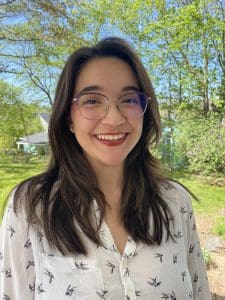 Katya Mueller, a student in Syracuse University’s Master of Library and Information Science Program, was selected as a 2023 National Center for Data Services Data Librarianship Internship participant.
Katya Mueller, a student in Syracuse University’s Master of Library and Information Science Program, was selected as a 2023 National Center for Data Services Data Librarianship Internship participant.
Mueller, who plans to graduate in Spring 2024, interned with the Cary Institute of Ecosystem Studies this summer to work on the “Ecology of Infectious Disease” project. The independent, nonprofit organization is working to predict the next outbreak before it happens by using artificial intelligence and big data to protect human health.
“I was excited to learn about the internship and knew I had to apply,” says Mueller.
She was selected after a highly competitive application and external review process. The internship is aimed at helping graduate students from underrepresented racial and ethnic groups gain experience in data librarianship and related skills, such as using Python, RStudio, Tableau and more. The paid internships offer students opportunities to work with real-life data and scenarios while working with a mentor.
“I was looking for some good experiences over the summer to expose myself to other areas of librarianship,” says Mueller. “Data librarianship is gaining lots of attention as of late, and the field has been rapidly growing. I wanted to learn more about data librarianship: What does it mean? What kind of responsibilities do they have? What kind of skills do you need to become one?”
Through her work with the Cary Institute, Mueller looked specifically at a dataset that compiled global alphavirus case studies in mammals. Alphaviruses include diseases such as Sindibis, Chikungunya, Mayaro, and more.
“My responsibility over the summer was to finish compiling the latitude and longitude coordinates to visualize the data in map form, as well as utilize various RStudio packages to explore the dataset and identify trends,” Mueller says. “Alphaviruses as a whole are understudied, despite their wide geographical distribution. This only further highlights the importance of understanding alphaviruses, not only their impact on humans but on animals as well.”
Class Opened Her Eyes
During her first year in Syracuse’s MLIS program, Mueller took a course taught by Syracuse Humanities Librarian Patrick Williams. The class has stuck with her ever since.
“The course about Digital Humanities and library work opened my eyes to the many possible careers within librarianship,” says Mueller. “Our discussions went past the academic and into real-world scenarios – looking at the ethics of data usage and the importance of properly representing information to the masses.”
The class was a general introduction to an array of methods, including text analysis, electronic literature, spatial analysis, and visualization and their applications to libraries and other related settings.
For her final project in the class, she decided to take on a small data curation project and collected information about ancient Roman and Greek libraries, such as time built, patrons, location, geographical coordinates, events of interest, etc. She then created visualizations based on that data.
Employment on Her Mind
With graduation approaching next year, Mueller says employment has been on her mind. She plans to apply to academic libraries’ residency programs that are designed to expose recent MLIS graduates to different departments within the library.
Residencies typically last two to three years and give students valuable first-hand experience and opportunities to try different roles.
“I still have a lot to learn within the field of librarianship, as there are so many different types of library jobs that exist,” says Mueller. “I believe a residency would be extremely beneficial as I continue to navigate this extremely broad field.”
Although the field is broad, Mueller says she knows she wants to work in a research capacity that helps students, faculty, researchers and others reach their goals.
“I have seen so many incredible social justice projects that stemmed from the library, shedding light on important and often uncomfortable history,” says Mueller.
One that comes to mind for her is the University of Minnesota’s Mapping Prejudice project, which visualizes and identifies racial clauses that were inserted into property deeds, exposing a history of structural racism.
“Learning about such a project, I felt a sense of empowerment,” says Mueller. “Librarians, historians, geographers, and community activists all came together to do community-centered work. Not only are they educating and raising awareness of history, but they are supporting the work of reparations and making their maps and data available for use by all.”
No matter what kind of work she takes on after graduation, Mueller says she has a vision for how she hopes to impact others.
“Most importantly, I want to stay connected with the community I serve, leveraging the library and its resources for social justice,” she says.
